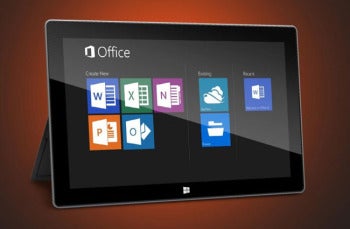Office 2013 on a Tablet vs. Touch-Friendly Competition
With the latest iteration of Office, Microsoft pledges to bring the documents
and services you need to run a business to any screen you choose, from a PC to a
touch-enabled Windows Surface tablet or Windows 8 Phone. After using the Office
2013 preview suite on a Windows 8 tablet, we are impressed by many of the steps
Microsoft has taken to make its Office franchise touchscreen ready and cloud
friendly.
If you're searching for the ultimate mobile-savvy office suite for a tablet,
look no further. Compititors available on other platforms, such as DataViz's
Docs to Go or Quickoffice and services, including CloudOn, Nivio, Online Desktop
and InstallFree Nexus, which deliver virtualized,
full-blown versions of Office apps, lack the unified soup-to-nuts office
document, collaboration, and editing functionality that Office 2013
delivers.
But you’ll probably have to pay dearly for the no-compromise experience of
Office 2013 or Office 365 (the subscription-based software-as-a-service
alternative that combines desktop installations with cloud-based access on
remote devices). Microsoft hasn't disclosed pricing yet, but it's difficult to
imagine a scenario where the subscription fees in the course of a year or two
would undercut what they'd charge for a conventional one-time desktop
installation
Comparing Apples to Oranges
Also, we don’t yet know what mobile devices either Office 2013 or Office 365
will support. When asked, Office spokespeople have indicated that some form of
Office Mobile (currently available only for Windows Phone) will be forthcoming
for Android and iOS devices. But it's highly unlikely we'll see a full-blown
version of Office running on the Apple and Google mobile operating systems.
We also have yet to see whether, as Microsoft CEO Steve Ballmer promised, Office
2013 will run as smoothly on an ARM-based tablet running Windows 8 RT (the
version of Windows 8 for tablets that aren’t based on x64 or x86 CPUs) as it did
on the tablet PC used to show off the suite's new features at Monday's official
unveiling of the public beta. The touch optimization was admittedly impressive,
but we were witnessing a best-case scenario: Samsung's touch-enabled tablet PC
running Office on the desktop version of Windows 8.
For these reasons, affordable if limited mobile productivity suites such as
Quickoffice and Docs to Go (both $15
for Android devices and $20 for the iOS version), single-purpose apps such as Apple’s
Pages word processor for the iPad ($10), and virtualized cloud services such
as Nivio
($15 monthly) remain viable rivals.